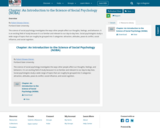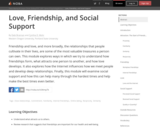
Text and links to all ancillary materials for Module 55
- Subject:
- Psychology
- Social and Behavioral Sciences
- Material Type:
- Module
- Reading
- Teaching/Learning Strategy
- Author:
- Leslie Zebrowitz
- Robert G
- Date Added:
- 05/31/2021

Text and links to all ancillary materials for Module 55

By Robert Biswas-Diener, Portland State University. The science of social psychology investigates the ways other people affect our thoughts, feelings, and behaviors. It is an exciting field of study because it is so familiar and relevant to our day-to-day lives. Social psychologists study a wide range of topics that can roughly be grouped into 5 categories: attraction, attitudes, peace & conflict, social influence, and social cognition.

By R. Chris Fraley, University of Illinois at Urbana-Champaign.The purpose of this module is to provide a brief review of attachment theory—a theory designed to explain the significance of the close, emotional bonds that children develop with their caregivers and the implications of those bonds for understanding personality development. The module discusses the origins of the theory, research on individual differences in attachment security in infancy and childhood, and the role of attachment in adult relationships.

By M. Brent Donnellan, Michigan State University. This module describes different ways to address questions about personality stability across the lifespan. Definitions of the major types of personality stability are provided, and evidence concerning the different kinds of stability and change are reviewed. The mechanisms thought to produce personality stability and personality change are identified and explained.

Text and links to all ancillary materials for Module 56

Psychology is designed to meet scope and sequence requirements for the single-semester introduction to psychology course. The book offers a comprehensive treatment of core concepts, grounded in both classic studies and current and emerging research. The text also includes coverage of the DSM-5 in examinations of psychological disorders. Psychology incorporates discussions that reflect the diversity within the discipline, as well as the diversity of cultures and communities across the globe.Senior Contributing AuthorsRose M. Spielman, Formerly of Quinnipiac UniversityContributing AuthorsKathryn Dumper, Bainbridge State CollegeWilliam Jenkins, Mercer UniversityArlene Lacombe, Saint Joseph's UniversityMarilyn Lovett, Livingstone CollegeMarion Perlmutter, University of Michigan



By the end of this section, you will be able to:Describe altruismDescribe conditions that influence the formation of relationshipsIdentify what attracts people to each otherDescribe the triangular theory of loveExplain social exchange theory in relationships

Provides standard introduction to psychology course content with a specific emphasis on social aspects of psychology. This includes expanded content related to social cognition, aggression, attraction and similar topics.

A brief description of prosocial behavior and the major issues related to prosocial behavior. Duration: 3:11.